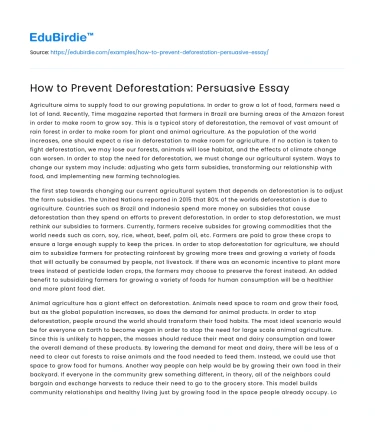Agriculture aims to supply food to our growing populations. In order to grow a lot of food, farmers need a lot of land. Recently, Time magazine reported that farmers in Brazil are burning areas of the Amazon forest in order to make room to grow soy. This is a typical story of deforestation, the removal of vast amount of rain forest in order to make room for plant and animal agriculture. As the population of the world increases, one should expect a rise in deforestation to make room for agriculture. If no action is taken to fight deforestation, we may lose our forests, animals will lose habitat, and the effects of climate change can worsen. In order to stop the need for deforestation, we must change our agricultural system. Ways to change our system may include: adjusting who gets farm subsidies, transforming our relationship with food, and implementing new farming technologies.
The first step towards changing our current agricultural system that depends on deforestation is to adjust the farm subsidies. The United Nations reported in 2015 that 80% of the worlds deforestation is due to agriculture. Countries such as Brazil and Indonesia spend more money on subsidies that cause deforestation than they spend on efforts to prevent deforestation. In order to stop deforestation, we must rethink our subsidies to farmers. Currently, farmers receive subsides for growing commodities that the world needs such as corn, soy, rice, wheat, beef, palm oil, etc. Farmers are paid to grow these crops to ensure a large enough supply to keep the prices. In order to stop deforestation for agriculture, we should aim to subsidize farmers for protecting rainforest by growing more trees and growing a variety of foods that will actually be consumed by people, not livestock. If there was an economic incentive to plant more trees instead of pesticide laden crops, the farmers may choose to preserve the forest instead. An added benefit to subsidizing farmers for growing a variety of foods for human consumption will be a healthier and more plant food diet.
Save your time!
We can take care of your essay
- Proper editing and formatting
- Free revision, title page, and bibliography
- Flexible prices and money-back guarantee
Animal agriculture has a giant effect on deforestation. Animals need space to roam and grow their food, but as the global population increases, so does the demand for animal products. In order to stop deforestation, people around the world should transform their food habits. The most ideal scenario would be for everyone on Earth to become vegan in order to stop the need for large scale animal agriculture. Since this is unlikely to happen, the masses should reduce their meat and dairy consumption and lower the overall demand of these products. By lowering the demand for meat and dairy, there will be less of a need to clear cut forests to raise animals and the food needed to feed them. Instead, we could use that space to grow food for humans. Another way people can help would be by growing their own food in their backyard. If everyone in the community grew something different, in theory, all of the neighbors could bargain and exchange harvests to reduce their need to go to the grocery store. This model builds community relationships and healthy living just by growing food in the space people already occupy. Local growing will have its limits in many parts of the world due to the environment and people who live in apartments are limited by space but it shouldn’t stop people from getting creative with their growing abilities. Even if someone doesn’t have a yard to grow food, technology has made it possible to grow plants indoors. Now imagine what technology could do to revolutionize agriculture.
Agriculture has already had a helping hand from technology, everything including the plow, tractors, fertilizers, and the genetically engineering has already made agriculture a decently productive system. Yet, there’s always room for improvement. To fight deforestation for agriculture, we should use technology to increase food production and develop new growing equipment. Technology can help increase food production by introducing more GMO crops which can are formulated to withstand a greater amount of outside pressures (climate, pests, diseases) and also can produce more food. Doing so will make agriculture less susceptible to diseases and can keep the food market secure. Another way technology can benefit society would be by creating more affordable indoor grow boxes for people that would like to grow their own food but can’t due to a lack of a yard. There are sophisticated setups already on the market to grow plants indoors but these setups are expensive (roughly $1000). In order to fight deforestation, people should be able to afford an indoor grow box to grow their own food. The idea behind this being, if people grow their own food, they won’t need to rely on farmers to do it for them, therefore reducing the need for deforestation.
Many of my suggestions to stop or slow deforestation are somewhat already beings done. There is a massive movement towards veganism in the past few years due to it being the least damaging diet on the environment. Additionally, scientists are always working to develop new modified crops to benefit mankind. Lastly, food technology has given rise to plant based ‘meats’ which have a similar texture and taste to meat but is made entirely of plants. These are just some actions currently happening but it isn’t happening at the rate it should. Since our global population is steadily rising, we must make moves fast to prevent further deforestation of our rainforests before they’re gone forever.
References:
- Levetin, E., & McMahon, K. (2019). Plants & society. Boston: McGraw-Hill Higher Education.
- Sullivan, Z. (2019 August) The Real Reason the Amazon is on Fire. Time. https://time.com/5661162/why- the-amazon-is-on-fire/
- United Nations. (2015) Government Subsidies for Agriculture May Exacerbate Deforestation, says new UN report. https://www.un.org/sustainabledevelopment/blog/2015/09/government-subsidies- for-agriculture-may-exacerbate-deforestation-says-new-un-report/






 Stuck on your essay?
Stuck on your essay?

